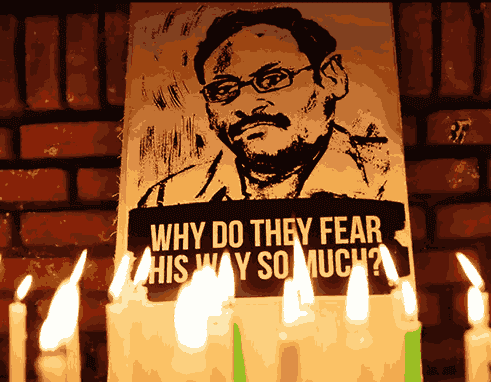On 15th October, 2024, a tribute was paid to Professor G.N. Saibaba at Arts Faculty Gate, University of Delhi, posthumously. A public meeting and a candlelight vigil were observed by students’ and teachers’ organizations, which were joined by civil society members, colleagues, and activists who worked alongside Saibaba.
G. N. Saibaba, former Assistant Professor at Delhi University, passed away on October 12 at the Nizam’s Institute of Medical Sciences in Hyderabad due to postoperative complications after a surgery to remove gallbladder stones. Saibaba was arrested in 2014 under the “draconian” UAPA for charges of working alongside members of the banned CPI (Maoist) and its alleged frontal organization, the Revolutionary Democratic Front. In 2021, Delhi University terminated his employment following the UAPA case against him. However, he was not reinstated after his acquittal in March 2024. It was claimed by many that Saibaba, a 90% disabled academic and human rights activist, was “wrongfully incarcerated” for a decade and “tortured” by the state during court trials and also during the period of jail time where he was forced to live in solitary confinement, declined proper medical care, and even prohibited from meeting his mother after her passing away. Sai’s death was received as an institutional murder by fellow academics, students and others.
The solidarity and remembrance event at Arts Faculty included speakers who highlighted Sai’s resilience, his revolutionary spirit, and his long struggle against exploitation and oppression. The speakers included Professors Karen Gabriel, N Sachin, Abha Dev Habib, Vikas Gupta, Jitendra Meena, and Saroj Giri. Kamal Singh from PUCL, Jagdish from DGMF, and representatives of student groups also shared their memories and thoughts.
Addressing the people, Professor Karen Gabriel said,
The term Urban Naxal has been structured against those who have understood the logic of the system and move through it and destroy it…UAPA not only destroys individuals but also families and communities.
Professor N. Sachin urged the masses to rise in “remembrance and rage” for Saibaba “against a system of induced apathy.”
Professor Vikas Gupta held that,
It is in Saibaba that we see a commitment to social justice” and also that “it is not possible to fight against one kind of inequality; the struggle is against all violations of social justice.
In conversation with DU Beat, Professor Abha Dev Habib said,
Sai’s death is an institutional murder because his minimum needs such as medical care were not provided. The state could not prove anything against Saibaba even after 10 years. He was denied bail every time he approached the court, and even when the high court was to set him free, the state would go against it; he couldn’t get justice from the state. All those who are opinion-builders, those who can speak for a more equal society and democratic rights, are being put behind bars. Sai Baba has been taken away too early from us. The University also did not give him justice. Even before it was proved he was guilty or not guilty, the university terminated his employment. By terminating his employment, his right to livelihood was also taken away. The state, the society, and we as people have wronged him by not speaking up.
The cause of all other political prisoners facing, what the participants maintained to be, “wrongful incarceration” was put forward, and it was demanded that they be released. They foregrounded the cases of activists such as Hany Babu, Umar Khalid, Sharjeel Imam, Gulshifa Fatima, and Rona Wilson who continue “languishing” in jails, undergoing extended trial periods, and face “terror litigation”.
Further, instances of “state-structured violence” and “physiological torture” of political prisoners jailed under UAPA was recounted, where people like tribal rights activists Stan Swamy and Pandu Narote, passed away in jail after their bails were denied on several counts.
Speaking to DU Beat, Professor Jenny Rowena, wife of Hany Babu, said,
We always talk about issues when somebody dies, then it becomes a viral thing. We saw Rohith Vemula when he was alive. How much attention do we give to these people? Even now, people who are in jail because they campaigned for Saibaba, like Hany Babu, Rona Wilson, and Surendra Gadling, who was their lawyer, are still in jail. These people also have a lot of health problems, so are we waiting for the same to happen to them? We all should really protest against UAPA. All condolence meetings that we have should also be against UAPA. There should be a mass movement against it, because they [the state] are using it ruthlessly now to crush any kind of opposition and dissent.
Further, slogans against the “genocidal” Operation Kagar and Surajkund Scheme were raised. The public meeting was followed by a candlelight vigil in which all friends, comrades, and students of the revolutionary Saibaba paid a tribute to him.
Read also: Of Separation, Solidarity, and Sustenance
Featured image credit: Shahid Tantray’s Instagram
Bhavana Bhaskar





Comments are closed.